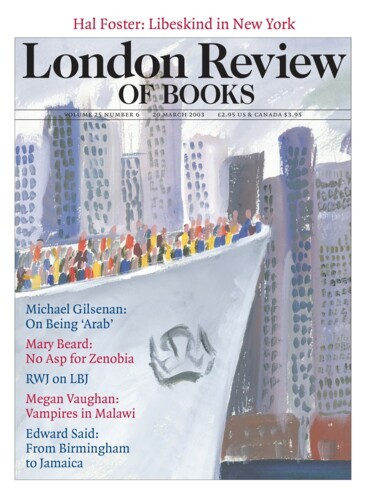And should I not pity Nineveh, that great city, in which there are more than a hundred and twenty thousand persons who do not know their right hand from their left, and also much cattle?
Jonah 4.11
1
In A Popular Account of Discoveries at Nineveh (1854)
Austin Henry Layard, the popular archaeologist and author,
is again among the ruins by the dying of October,
scattering some Arabs from a hostile tribe among the rest
to keep acquainted with what’s said in tents behind his back
and attentive to the threat of pilfered relics.
When he isn’t concluding a few summary punishments
to check the drawing of sabres and priming of matchlocks
or how the male Musselman is naturally this or commonly that,
he will ease pieces out from the flesh of the earth
as a midwife might, to weigh and catalogue and wrap
the objects for their journey, by way of Basra and Baghdad,
buffalo-carts of the pashaw and willow-rafts on the Tigris,
to the pale hands in the cool basement of the British Museum.
2
Layard watches oxen, harnessed on slopes built into the bank,
counter-weighting a bucket, the entire skin of a bullock,
which sinks down into the stream. Come late afternoon,
the cattle lie down in each other’s shadows.
Excavating the southern entrance to the north-west palace,
a limestone winged lion is exhumed, and inlaid above the wings:
A human figure, and a monster with the head of a lion,
the body of a man, and the feet of a bird, raising a sword.
Assyria dealt in fear. The Sargonids were politic and vicious.
But a voice from the south, a preacher repeating his God,
Yet forty days, and Nineveh shall be o’erthrown.
Stripped of sackcloth, the saved resume their businesses.
The buying and selling of incense, terebinth, currency, time.
Outside the city, Jonah lies down beside his dying gourd.
3
The cattle graze behind fences of cedar or herded,
are ambling down to the river to drink
in the time between milking and darkness.
They follow, obedient,
uninterested, swinging the sacks
of themselves down the dust tracks towards dusk.
Can they remember?
They catalogue hurt.
At the enclosure of night they lift gazes to prophets,
a white man on horseback, Ninevite warriors,
the slip of a cowherd who keeps them,
to Jonah, the moon, whoever is there,
pool-eyed and aware
how close they come.
4
Gertrude Bell is spending a pleasant afternoon riding over
the Mesopotamian desert. The Great War has ended.
She trails a walking stick behind her in the sand to mark a boundary
as Arab boys build cairns on it to set frontiers for these new countries.
The cattle wear down their paths into roads
and the rivers move under the borders.
The kingdom of here. Relics and oilfields.
Satellites mistaken for portents. The engine of man is desire.
We are again among these ruins and the dying.
A human figure, and a monster with the head of a lion,
the body of a man, and the feet of a bird, raising a sword.
A line in the sand begins to unwind in the machinery of wind
which starts up and ticks over as the flies come to grief
and the cattle lie down in each other’s shelter.
Send Letters To:
The Editor
London Review of Books,
28 Little Russell Street
London, WC1A 2HN
letters@lrb.co.uk
Please include name, address, and a telephone number.

